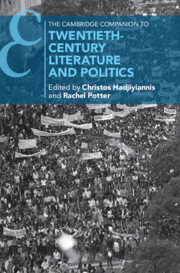Book contents
- The Cambridge Companion to Twentieth-Century Literature and Politics
- The Cambridge Companion to Twentieth-Century Literature and Politics
- Copyright page
- Contents
- Figures
- Notes on the Contributors
- Acknowledgements
- Chronology
- Introduction Literature and Politics
- Part I 1900–1945: Ideas and Governance
- Part II 1945–1989: New Nations and New Frontiers
- Chapter 6 Partitions
- Chapter 7 Federalism
- Chapter 8 Cold War
- Chapter 9 Irish Nationalism
- Chapter 10 Black Nationalism
- Chapter 11 Caribbean Nationalisms
- Chapter 12 African Nationalisms
- Chapter 13 Apartheid
- Part III 1989–2000: Rights and Activisms
- Further Reading
- Index
- Cambridge Companions To …
Chapter 8 - Cold War
from Part II - 1945–1989: New Nations and New Frontiers
Published online by Cambridge University Press: 01 December 2022
- The Cambridge Companion to Twentieth-Century Literature and Politics
- The Cambridge Companion to Twentieth-Century Literature and Politics
- Copyright page
- Contents
- Figures
- Notes on the Contributors
- Acknowledgements
- Chronology
- Introduction Literature and Politics
- Part I 1900–1945: Ideas and Governance
- Part II 1945–1989: New Nations and New Frontiers
- Chapter 6 Partitions
- Chapter 7 Federalism
- Chapter 8 Cold War
- Chapter 9 Irish Nationalism
- Chapter 10 Black Nationalism
- Chapter 11 Caribbean Nationalisms
- Chapter 12 African Nationalisms
- Chapter 13 Apartheid
- Part III 1989–2000: Rights and Activisms
- Further Reading
- Index
- Cambridge Companions To …
Summary
This chapter explores the politicisation of literature during the period of the Cold War. It argues that literature became a key coin in the cultural cold war, invested with the power to represent working-class subjectivity and class struggle by the Soviets, and construed as embodying and igniting individual liberty by the US. Literary writers and literature, during the cultural cold war, were both censored and funded as never before. While the Soviets took control of book production by both censoring and funding writers, the US pumped enormous sums of money into funding global literature deemed representative of individual freedoms. The literary dissident, stifled by the East and lionised by the West, was a key figure in cultural cold war politics. The chapter focuses on two very different kinds of writers, Stephen Spender and Doris Lessing, who were shaped by the conditions of the cultural cold war. Both writers viewed their literary writing in the light of the politics of the Cold War, and used their writing to explore the political issues of censorship, freedom, and dissidence.
- Type
- Chapter
- Information
- Publisher: Cambridge University PressPrint publication year: 2022

